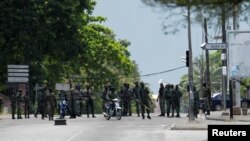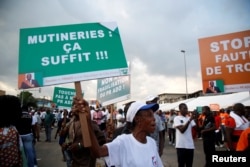Three people have been reported wounded in Bouake, Ivory Coast, where mutinous soldiers have sealed off all four access points to the city to protest an unresolved pay dispute.
The injuries were reported Saturday by a spokesman for the mutineers. Seydou Kone said the injured were three demobilized rebel fighters from the Ivorian civil war in 2011. He said his comrades shot the rebel fighters to keep them from staging their own protest march.
The violence started in Bouake on Thursday, after a spokesman for about 8,000 soldiers who mutinied in January publicly apologized to President Alassane Ouattara and said the soldiers were giving up their financial demands.
Rebellious soldiers took up the charge in the country’s commercial capital, Abidjan, by Friday.
Disciplinary action threatened
Ouattara convened a meeting Friday with the country’s defense and interior ministers to discuss the uprising. Afterward, Military Chief of Staff General Sekou Toure appeared on television and threatened the soldiers with disciplinary action if they did not end their revolt.
By Saturday, soldiers were marching in the streets in the central city of Daloa and the northern city of Korhogo.
The BBC cites reports that say the city of Odienne has also been taken over by mutineers. Many businesses are closed, and soldiers have been firing their weapons into the air.
Dispute over pay
The soldiers’ January uprising ended after the government agreed to give them bonus pay. But the soldiers have only received part of what they were promised.
The Ivorian government has asked for a delay in paying the rest because of a collapse in the price of cocoa, the country’s main export.
The mutinous soldiers are former rebels who helped bring Ouattara to power when his predecessor refused to step down after losing an election in 2010.
Following the January mutiny, which also began in Bouake, Ouattara fired the heads of the army, police and gendarmes.
Bouake was the center of a rebellion that began in 2002 with a failed attempt to oust then-president Laurent Gbagbo. That uprising divided the country into the rebel-held north and the government-controlled south for nearly a decade.






